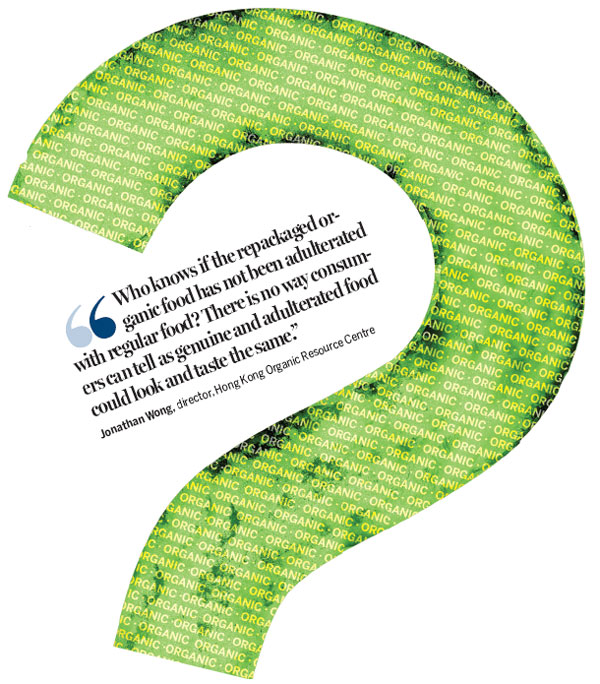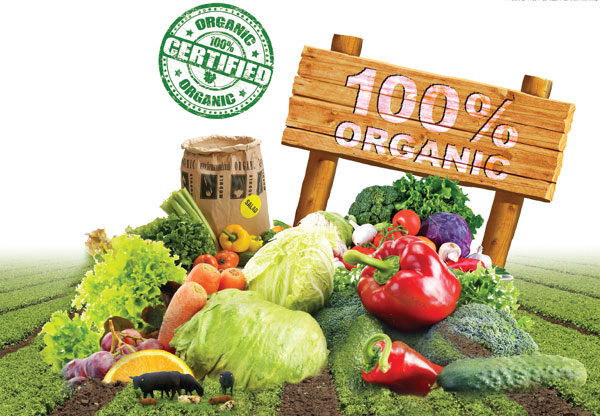A truth that's hard to digest
Updated: 2015-09-17 09:57
By Andrea Deng(HK Edition)
|
|||||||
Much of what passes off in Hong Kong's vegetable markets as 'organic' and costs twice as much as the chemically fertilized variety, could in fact be of dubious quality, reports Andrea Deng.
Natural. Green. Organic. Healthy. Also expensive. Since "organic food" is defined by law in the United States, its consumers are legally protected.
In Hong Kong, however, the "organic" tag could just be a clever marketing tool. With loose regulations and no specific law on organic products, consumers risk paying high price for fake organic food.
Earlier this year, a market research conducted by the Hong Kong Organic Resource Centre (HKORC), a local organic products certification body, showed that 18 percent of 425 wet market stalls are selling what they claim is organic food, but only 30 percent of these could provide valid certificates to prove it.
"Organic means something that is grown on soil without synthetic chemical pesticides, fertilizers, etc.," said Tracy Turo, co-founder and CFO of Ekowarehouse, a Hong Kong-based business-to-business online platform where trade companies can source certified organic products from suppliers worldwide.
"So the major organic (certification) labels all contain very specific, scientific details. Some of these labels are supported by the government. The United States Department of Agriculture, for example, is run by the American government. There are laws, and you will be fined if you don't follow it or if you use the label incorrectly," said Turo.
So 70 percent of vendors might be passing off sub-standard products, or worse, fake organic food grown using artificial pesticides or fertilizers, as organic food.
HKORC found that vendors who did not have proof of certification asked for the same high price as those who did. Currently, the average price of organic vegetable is HK$25 per catty - at least double that of conventional vegetable.
The Hong Kong authority had previously dismissed public concern over the authenticity of the organic food in the market, as well as the need to regulate these in a more stringent way. They said the demand for organic food in Hong Kong was small - accounting for only 2.4 percent of the total food sale - and that imposing more stringent regulations would reduce the choices available to consumers.
However, the number of organic food consumers is slowly rising. Peter Johnston, ParkNShop's quality and food safety director, greater China, told China Daily that their organic food products saw a double-digit sales growth last year. In a 2012 survey HKORC found 16.2 percent of Hong Kong people were spending at least HK$500 per month on organic food, nearly twice as many as in 2008.
Dubious certifications
The authenticity of organic food products in Hong Kong is not checked by a government department. Neither do local regulations require certification labels pasted on organic food products. This would be illegal in European Union countries.
China Daily found that Vitasoy's series of Sansui soybean products - including packaged tofu and soymilk - claimed to use organic soybean, without providing any certification labels on their product package.
Vitasoy told China Daily their soybeans are "certified via qualified third-party organizations", refusing to give away their names. Many such organizations around the world are profit-making bodies, and some of those on the Chinese mainland are murky and non-trustworthy.
Vitasoy claimed their Sansui series had the most market share among similar products in Hong Kong, some of which also failed to display a valid certificate.
The literature on Sansui products, printed in very small font, show they contain additives such as firming agents and anti-foaming agents. There is no guarantee these are organic ingredients as well.
Vitus Leung, the solicitor, said an enterprise might be held liable only when a consumer files a complaint to Customs and Excise Department alleging the enterprise had violated the Trade Description Ordinance. Products passed off as organic, if proved to be otherwise, could be illegal.
But such deceitfulness may not be easy to prove in court, given the word "organic" is not defined in Hong Kong law and nor does the Hong Kong government have a set of strict and specific guidelines as to growing, processing, labeling and marketing organic food.
When it comes to imported organic food, Hong Kong counts on standards set by the origin countries of those food products.
If a case is brought up to court asking to prove a particular product is organic, as is claimed, the defendant - namely the food supplier - could apply the least demanding set of standards, Leung said.
"There is a chance that the defendant adopts the lowest standard which the product could satisfy. In that case, is it acceptable for Hong Kong consumers?" Leung argued.
Look for the source
Sonalie Galardi-Este Figueiras, founder and CEO of Ekowarehouse, said, "If you don't have regulation about a word, then that word can be misused. My advice would definitely be only pay more for organic if you either know the producer and you've seen how they make it - you know, small local artisan - or you can check the certification," she said.
Figueiras learned to stay healthy the hard way. "I had, in my early 20s, a lot of chronic health issues that medicine wasn't addressing. Nothing seemed to work, no medicines, no treatment," she said.
Naturally curious, Figueiras found out about how toxins existing in the environment, the food she ate and the cosmetic she applied were affecting her health. So she started to make an effort to choose and eat fresh, organic food - "with difficulty".
"At that time in Hong Kong - six or seven years ago - the choices were very limited. I remember I was using an online sourcing platform to look for organic coconut sugar but wasn't able to find it. There were very few organic food suppliers. I couldn't tell whether they're certified, I had no idea if the companies were real," said Figueiras.
Figueiras started sharing her knowledge of organic food accumulated through research through her blog Green Queen, and later founded Ekowarehouse.
Since she began eating organic food, she felt a lot of her health conditions have calmed down. "Unfortunately I have a lot of health conditions that are chronic, so they cannot be cured, but they're much better contained and my symptoms are much better controlled when I eat food that is clean," she said.
Other regular organic food consumers told China Daily that they purchased organic food because they wanted to try to cut down intake of artificial chemicals such as pesticides or fertilizers - contained in small amounts in food but accumulated in one's system over the long run.
However, a lot of them - unlike Figueiras, who has studied organic food for years - do not know how to tell the authentic variety from the dubious.
Jonathan Wong Woon-chung, director of HKORC, said in another market research done in 2014, about 15 percent of the 811 samples of organic rice and cereal products available in the supermarket - grains, wheat, beans, corns, etc - came with labels containing confusing keywords. Products tagged as "natural", "green" or even "containing organic ingredients", "used organic compost" ,etc. were found to contain artificial chemicals. However, consumers would generally take these products as belonging in the organic food category, Wong said.
Wong, who is also a biologist with the Hong Kong Baptist University, told China Daily about his skepticism and worry over some of the supermarkets' imported, repackaged organic cereal products. These products are repackaged in Hong Kong which might subject certified organic food to contamination or even adulteration. A much-needed second certification process is still not in place.
"The repackaging material used, the whole process of the food being repackaged, whether the cleansing agents contaminate the original organic food -- these are the things that remain entirely unknown and that's what we're concerned about.
"So if we have genuine retailers everything would be fine. But who knows if the repackaged organic food has not been adulterated with regular food? There is no way consumers can tell as genuine and adulterated food could look and taste the same," Wong explained.
Know what you eat
People are generally unfamiliar with the concept of organic food in Hong Kong, as is evident from the small demand.
"You have to be an educated consumer. It's the same with anything in your life. You have to be checking and researching what you're buying," said Turo, of Ekowarehouse.
However, Sunit Dattani, general manager of Regency Spice - a half-a-century-old Indian spice supplier that has set up office in Hong Kong a couple of years ago - said the government needs to do more in providing useful information to consumers.
"I think the government needs to do more, telling consumers what is organic, what they're getting from organic that they don't get otherwise," said Dattani, who has been researching the subject of organic food for a while. Regency is not selling organic spices, though its products do avoid using artificial chemicals.
He wondered if a food product might still be called organic if it was labeled as containing 70 percent or 95 percent organic ingredients. Wong the biologist however explained certain processed food just could not be 100 percent organic.
But then customers cannot be too sure of the relative superior quality of a food if it is 70 or 95 percent organic, as they aren't told about what goes into the remaining 10 percent, feels Dattani.
"It's whether the consumers see the benefit of the 70 percent organic food and what it actually means, so they can give it a true value and decide on whether they still want to pay double price for the product, (that ultimately matters)," said Dattani.
Contact the writer at andrea@chinadailyhk.com


(HK Edition 09/17/2015 page10)